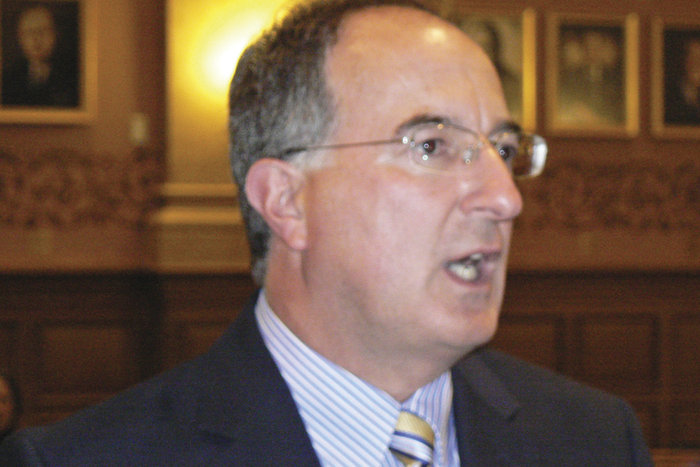The city’s 2013 budget is still several months away from being introduced and passed, but the city already expects that it will include a tax increase to pay for retirement benefits owed to hundreds of former city workers.
This comes after the City Council introduced a bond ordinance on Wednesday giving the city permission to borrow $9.5 million to cover what are known as “terminal leave” payments to city workers who have retired.
The council considered but failed to introduce a similar measure on Nov. 28.
Under the original proposal introduced last month, the average taxpayer would have paid $40 each year in taxes for every $125,000 of property owned to cover retirement benefits between 2013 and 2017. But several members of the council were unhappy with this proposal and argued that they wanted to see this debt paid down sooner rather than later.
The revised proposal pays off a third of this $9.5 million debt in 2013.
____________
However, these increases will likely be affected by other revenue and expenses once the 2013 budget is introduced, meaning the actual tax required to pay retiree benefits could increase or decrease.
For the revised ordinance to be introduced, it needed at least six votes from the council. Council members Michael Sottolano, Nidia Lopez, Steven Fulop, Peter Brennan, William Gaughan, Viola Richardson, and Diane Coleman all voted on Wednesday to introduce the revised proposal. Councilmen David Donnelly and Rolando Lavarro Jr. did not attend the special council meeting and thus did not vote on the measure.
A public hearing on the measure and vote for final adoption will be held at the council’s next meeting on Wednesday, Dec. 19 at 6 p.m.
The amount of money owed to retirees is only a small part of the city’s annual expenditures. The municipal budget for 2012 is $486 million.
Kelly: An ‘ugly’ issue
According to City Business Administrator Jack Kelly, who made a presentation to the City Council during the special session, the city has seen a dramatic increase in the number of retirees over the past two years.
“We have an issue that is ugly to begin with, and that is the issue of terminal leave,” Kelly told the Reporter after the vote. “In 2010, the state legislature was talking about capping or eliminating terminal leave. As a result, there was an inordinate amount of people who retired. In 2010, we had 303 people who were eligible to retire. In 2011, we were down to 174 because 129 of them got nervous and they all packed it in.”
Terminal leave is any unused sick leave that workers accrue during their years of employment. In many municipalities senior employees who have been on the job for 20 years or more can sometimes have hundreds of unused sick days by the time they are ready to retire. When employees are owed payouts for their unused days, these payouts can top $100,000 or more.
The trend now is to cap or eliminate such terminal leave payments, and as a result, many municipal employees who have a lot of time accrued are choosing to retire.
Before the surge in retirements, Kelly said, the city had been spending about $4.5 million annually on terminal leave benefits for its retirees. By last year, however, this amount ballooned to $9.5 million. To address the problem, the city has, since 2010, chosen to borrow money rather than levy taxes to meet its terminal leave commitments. Under state law, these commitments can be financed over a period of five years.
Kelly noted that these commitments will decrease over time, since fewer municipal employees will be eligible for retirement in the coming years, and terminal leave payments are already being phased out. The city, he said, has been working to eliminate terminal leave by addressing the issue in its collective bargaining contracts that come up for renegotiation.
Fulop to Kelly: ‘Show me the budget’
Despite the successful introduction, some council members still have concerns with the revised proposal and it’s unclear whether it will garner enough votes to pass on Dec. 19.
“I’m going to vote to introduce,” said Councilman Steven Fulop, who is running for mayor next year. “But by no means should this be taken as a vote to adopt. There’s no budget yet. So, whether it’s $40, $67, there’s no revenue. There are no expenses. We haven’t done a budget yet for next year. The argument is, if you’re going to increase $40 or $67, then by the same token you should be able to say to the business administrator, ‘Let me see the entire budget.’ It should be a working document, if that’s the case. You can’t just pull one thing out of the air and say, ‘This is going to cost this [amount of money] if we don’t pass this.’ It doesn’t work that way.”
Councilwoman Viola Richardson also expressed a preference for spreading out the retirement debt over five years in equal payments, rather than paying off a third of the debt in the first year.
According to Kelly, this loan would not affect the state’s mandatory 2 percent tax increase cap since “debt is excluded from our cap.”
E-mail E. Assata Wright at awright@hudsonreporter.com.
